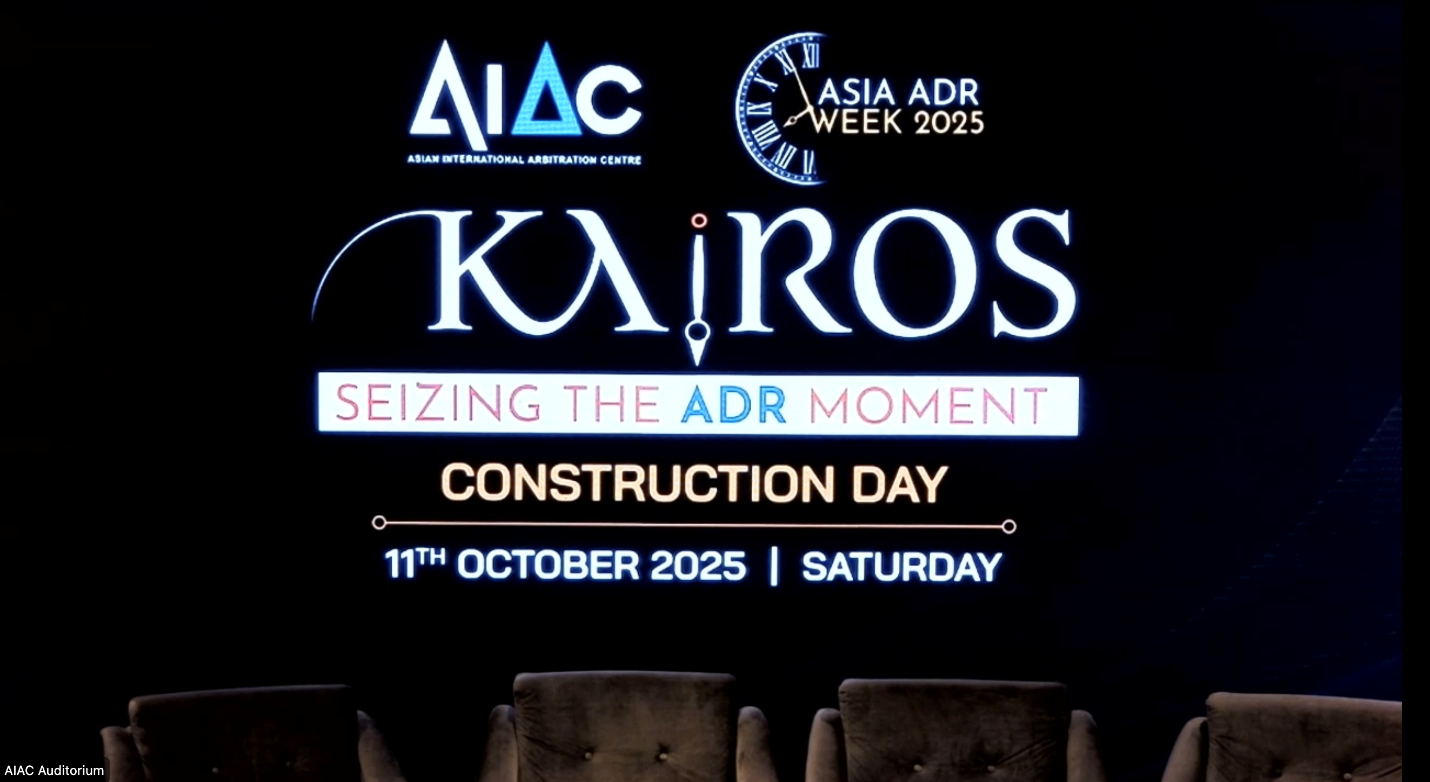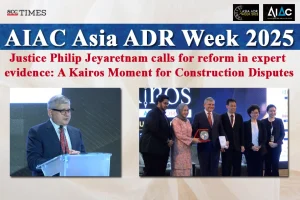The third day of AIAC Asia ADR Week 2025, designated as ‘Construction Day’, commenced with a series of engaging and insightful sessions, setting the tone for a day dedicated to exploring the evolving landscape of dispute resolution in the construction industry.

The day was formally inaugurated with opening remarks by Ms. Dato’ Mary Lim Thiam Suan, Director of the Asian International Arbitration Centre (AIAC), who welcomed delegates and highlighted the significance of fostering dialogue and collaboration in the field of construction arbitration and alternative dispute resolution.
A major highlight of the morning was the keynote address delivered by Justice Philip Jeyaretnam, President of the Singapore International Commercial Court. His address was both dynamic and thought-provoking, offering deep insights into the complexities and future of construction disputes in the international commercial arena. Justice Jeyaretnam’s remarks resonated with practitioners, academics, and policymakers alike, encouraging innovation and integrity in dispute resolution processes.
Opening Remarks by Ms. Dato’ Mary Lim Thiam Suan
The third and final day of AIAC Asia ADR Week 2025, themed Construction Day, commenced with a warm and spirited address by Dato’ Mary Lim Thiam Suan, Director, AIAC. Her remarks set the tone for a day dedicated to celebrating the construction sector’s critical role in dispute resolution and economic development.
Dato’ Mary began by graciously welcoming the distinguished guests, including Justice Philip Jeyaretnam, President, Singapore International Commercial Court, and Justice Lim Chong Fong, Judge, Court of Appeal. She also acknowledged the presence of other notable attendees gathered at the Arbitrators’ Lounge.
Turning to the heart of the day’s theme, she underscored the importance of returning to the core of the ADR community — the construction sector. With Construction Day being a dedicated platform for professionals and stakeholders in this space, she highlighted its significance as AIAC’s way of saying “thank you” for the community’s unwavering trust and support.
Dato’ Mary also pointed to compelling industry data, noting that Malaysia’s construction sector had grown by 20% in the previous year, with a projected market value nearing USD 60 billion within five years.
She shared promising updates from AIAC’s adjudication space, reporting over 600 cases with a total claim value just under USD 1.8 billion, reflecting both the increasing demand for dispute resolution and the centre’s commitment to growth. New courses and continuing development workshops were also in the pipeline to further strengthen the pool of adjudicators, especially beyond the Klang Valley.
Dato’ Mary took a moment to spotlight the success of the Asian Young Arbitrators Summit, crediting its energy and innovation for shaping the future of ADR.
She concluded by celebrating the official launch of the AIAC 2026 Suite of Rules, due to come into effect on 1st January 2026.
Keynote address by Justice Philip Jeyaretnam
In a compelling keynote address that set a reflective and forward-looking tone for Construction Day at AIAC Asia ADR Week 2025, Justice Philip Jeyaretnam, President of the Singapore International Commercial Court (SICC), offered a masterclass in legal clarity and strategic thinking on one of the most debated topics in construction arbitration: the use and management of expert evidence.
Justice Jeyaretnam began his address by paying tribute to Dato’ Mary Lim Thiam Suan, lauding her leadership and vision. Referring to her as “the embodiment of Kairos,” he highlighted how her presence and guidance had inspired not just the event, but the broader ADR community across the region.
Framing his keynote around the timely theme of Kairos, Justice Jeyaretnam called for a rethinking of how expert evidence is approached in construction disputes. Drawing attention to the often contradictory and unproductive nature of expert testimonies, he questioned whether current practices truly served the goal of just and efficient dispute resolution.
Expert evidence in construction disputes, he observed, “offers great promise, yet too often results in an unsatisfactory muddle.”
Justice Jeyaretnam proposed that the solution lies in early and effective case management , specifically, clear decisions at the outset regarding the scope, form, and method of adducing expert evidence. He advocated for a greater willingness to adopt single joint experts , especially in technically complex cases, where the risks of partisanship and duplication are high.
While acknowledging the familiarity and appeal of party-appointed experts, he cautioned against the tendency for such experts to veer into advocacy, leading to procedural inefficiencies and distractions from the core technical issues. He emphasised that expert credibility should not be reduced to courtroom theatrics, but instead be grounded in logic, substance, and reasoned analysis.
“Cases should be decided based on the right technical answers,” he stated, “not on which expert appears more objective or more qualified.”
Using the SICC’s Technology, Infrastructure, and Construction (TIC) List as a model, Justice Jeyaretnam shared how the Singapore judiciary ensures disciplined handling of expert evidence. He detailed the court’s structured approach: judge-led case management begins within weeks of filing; expert disciplines are identified early; permission to adduce expert evidence is stringently assessed; and the scope of expert inquiry is clearly defined through agreed facts and targeted questions.
He highlighted that no expert evidence is permitted in SICC proceedings unless the court is satisfied that it will materially assist in the determination of the issues. In many cases, he noted, expert input is better provided through agreed technical materials or statements of fact, avoiding unnecessary complications.
Justice Jeyaretnam’s address was not just a critique, but a call to action. He urged counsel and arbitrators alike to rethink how they approach expert testimony, not as a procedural formality, but as a tool to be deployed with precision and discipline, always in service of the ultimate goal: delivering justice.
In closing, he returned to the theme of Kairos, suggesting that now, amidst rapid developments in construction, law, and technology, was the opportune moment to embrace reform.
Justice Philip Jeyaretnam’s keynote left the audience with a clear and compelling message: the future of effective dispute resolution lies in precision, clarity, and proactive case management, especially in the handling of expert evidence.

